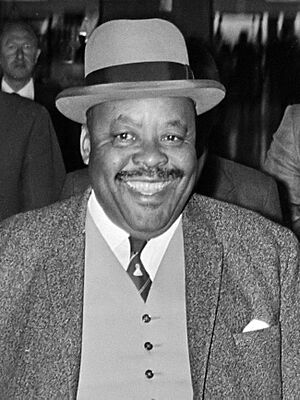Leabua Jonathan facts for kids
Quick facts for kids
Chief
Leabua Jonathan
|
|
|---|---|

Prime Minister of Lesotho Jonathan (1970)
|
|
| 1st Prime Minister of Lesotho | |
| In office 4 October 1966 – 20 January 1986 |
|
| Monarch | Moshoeshoe II |
| Preceded by | Office established; himself as Prime Minister of Basutoland |
| Succeeded by | Justin Metsing Lekhanya As chairman of the Military Council |
| 2nd Prime Minister of Basutoland | |
| In office 7 July 1965 – 4 October 1966 |
|
| Monarch | Elizabeth II |
| Preceded by | Sekhonyana Nehemia Maseribane |
| Succeeded by | Office abolished; he himself as the Prime Minister of Lesotho |
| Personal details | |
| Born |
Joseph Leabua Jonathan
30 October 1914 Leribe, Basutoland |
| Died | 5 April 1987 (aged 72) Pretoria, Transvaal South Africa |
| Nationality | Basotho |
| Political party | Basotho National Party |
Joseph Leabua Jonathan (born October 30, 1914 – died April 5, 1987) was a very important leader in Lesotho. He became the first Prime Minister of Lesotho in 1965 and served until 1986. He helped guide his country through its early years of independence.
Contents
Early Life and Work
Leabua Jonathan was born in a place called Leribe. He was a descendant of Moshoeshoe I, a famous king of the Basotho people.
Jonathan worked in a mine in South Africa for a while. Later, he returned to his home area. From 1937, he became involved in local government in Basutoland. He also joined groups that traveled to London. These groups asked for Basutoland to become self-governing.
Becoming Prime Minister
Jonathan became a Catholic and, in 1959, he started a political party. It was called the Basutoland National Party (BNP). This party later changed its name to the Basotho National Party.
In the 1960 election, his party came in fourth place. However, in the elections held in April 1965, the BNP won 31 out of 60 seats in parliament. This meant they formed the government. They led Basotho to independence in October 1966. Jonathan became Prime Minister on July 7, 1965.
After Basutoland became independent in 1966, it was renamed Lesotho. The Prime Minister, Leabua Jonathan, took over power from the British. Lesotho is completely surrounded by South Africa. Because of this, Jonathan's government tried to have peaceful relations with South Africa. Many people from Lesotho also worked in South African mines.
Challenges and Changes
In January 1970, Lesotho held its first elections after independence. Early results showed that Jonathan's party might lose. However, the ruling Basotho National Party (BNP) did not give up power. Prime Minister Jonathan said there were problems with the election. He then canceled the results and stopped the country's constitution. He also closed the parliament.
In 1973, a new group called the Interim National Assembly was formed. It mostly supported Jonathan's government. During this time, South Africa also caused problems for Lesotho. South Africa closed its borders because Lesotho supported the African National Congress (ANC). The ANC was a group fighting against apartheid in South Africa. South Africa even threatened to take stronger action against Lesotho. These problems led to unrest and violence in Lesotho. Eventually, the military took over the government in 1986.
Views on Apartheid
Lesotho depended a lot on South Africa for its economy. Even so, Jonathan started to speak out against South Africa's policy of apartheid. Apartheid was a system of racial segregation and discrimination. Jonathan supported the African National Congress (ANC), which was banned in South Africa.
Jonathan also accused the South African government of helping a group called the Lesotho Liberation Army (LLA). The LLA was a military group that opposed Jonathan's government. South Africa at first denied these claims. However, they later admitted that they had helped some members of the LLA.
Awards and Recognition
Leabua Jonathan received several awards for his work:
- He received the Dag Hammarskjöld award in 1983.
- He was given an honorary PhD in education from the National University of Lesotho in 1984.
- He was given the Companion of O.R. Tambo Award (gold) in 2007. This award was given after his death.
End of Leadership and Death
On January 20, 1986, a military coup took place in Lesotho. Major General Justin Metsing Lekhanya led this military takeover. The military removed Jonathan's government from power.
Leabua Jonathan was placed under house arrest in August 1986. He passed away from a heart attack on April 5, 1987. He was 73 years old.
 | Bayard Rustin |
 | Jeannette Carter |
 | Jeremiah A. Brown |

